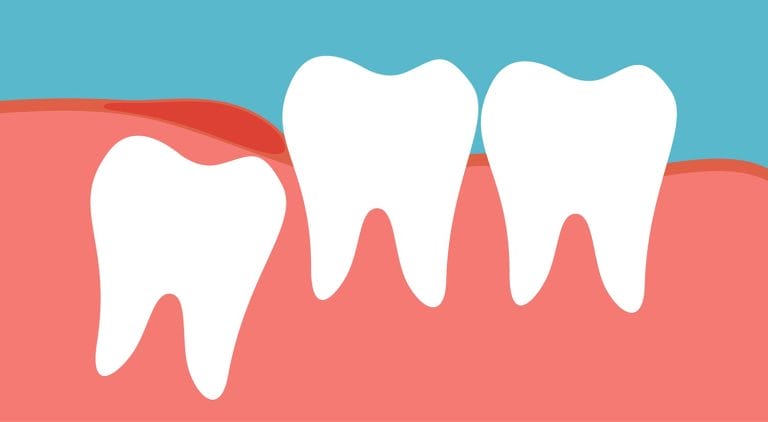While different people have varying stories about how and when their wisdom teeth erupted, others have very little to say because their wisdom teeth did not get to erupt, but whatever side of the divide you are on, there is nothing to worry about. Here are a few facts concerning wisdom teeth that might interest you.
Are you a Long Island resident and have questions about wisdom teeth? Our local Port Washington dental office is ready to see you!
What are wisdom teeth?
Also known as third molars. they are the last set of teeth that erupts in the mouth. Most people have four wisdom teeth at the back of their mouth, two on the upper jaw and two on the lower jaw. Unlike the front teeth, which tend to be sharp, third molars are flat with a large surface area.
Why are they called wisdom teeth?
There is no scientific reason why the third molars are known as wisdom teeth, but presumably, since they come in much later than the other teeth, mainly during the late teens or early adulthood, one is thought to be wiser by then.
When do wisdom teeth start coming in
For most people, third molars start erupting between the ages of 17 and 21 years. However, it is worth mentioning that all the teeth that one ever gets are usually present in the skull structure at birth. Therefore, just because your third molars are not visible does not mean you don’t have them.
Signs your wisdom teeth are about to come in
For some people, wisdom teeth come with just slight discomforts, while for others it’s a harrowing experience, especially if their teeth are impacted. Some telltale signs that your third molars might be on the way include:
- Reddening or swelling of the gum at the back of your mouth
- Tender gums
- Pain or discomfort in the jaws
- Difficulty chewing or opening the mouth
- A sudden movement of adjacent teeth
My wisdom teeth have not erupted. What gives?
The reasons why wisdom teeth fail to erupt vary from one person to another but mostly it’s due to inadequate space in the mouth, which causes the teeth to get stuck in the jaws. There is also a genetic angle to it. Researchers posit that with continued evolution, the human brain size has been expanding gradually, leading to diminishing space for the third molars to form correctly. Sounds farfetched and debatable but cannot be ignored, given the number of people whose third molars have failed to erupt is gradually increasing.
When third molars do not erupt, they are said to be impacted. your third molars can either be fully or partially impacted. Fully impacted means the teeth are entirely submerged beneath the gum tissue, while partially impacted means the teeth have broken the gum but are stuck.
How Long Does It Take for a Wisdom Tooth to Come In Once It Starts?
The process of a wisdom tooth fully erupting can vary significantly from person to person. On average, it can take anywhere from a few weeks to several months—or even years—for a wisdom tooth to fully come in once it starts breaking through the gums.
What Affects How Long It Takes?
- Age: Wisdom teeth typically begin to emerge between the ages of 17 and 25. The process may be slower in younger individuals because the jaw is still developing.
- Tooth Position: If the tooth is impacted (growing at an angle or stuck under the gum or bone), it may take much longer—or may never fully erupt on its own.
- Gum and Bone Density: Thicker gums and denser bone can slow down the eruption process.
- Space in the Jaw: If there’s limited room in your mouth, the tooth may emerge more slowly or get partially stuck, leading to a condition called partial eruption.
- Infection or Inflammation: If the area becomes inflamed (like in cases of pericoronitis, an infection around a partially erupted wisdom tooth), this can delay the process and cause discomfort.
Stages of Wisdom Tooth Eruption
- Pressure and Discomfort (Early Stage): You may feel a dull ache, pressure, or tenderness in the back of your mouth before the tooth visibly breaks through.
- Breaking Through the Gum (Eruption Begins): Once the tooth starts poking through the gums, you might notice redness, swelling, and soreness.
- Partial Eruption: The tooth may come in partway and stay like that for weeks or even months. This is common with impacted teeth.
- Full Eruption: If there’s enough space, the tooth will continue to emerge until it aligns with your other molars. This can take several months.
When to See a Dentist
You should schedule an appointment if you experience:
- Severe or worsening pain
- Swollen, tender, or bleeding gums
- Difficulty opening your mouth or swallowing
- Foul taste or bad breath (signs of infection)
- Jaw stiffness or swelling
These could be signs of complications like impaction, infection, or cysts, which may require professional evaluation or removal of the tooth.
What to do if you experience impacted third molars
The first action that you must take urgently when you suspect your third molars are impacted is to schedule an appointment with your dentist. Professional dentists at 3v Dental Associates will conduct a visual examination of the affected tooth or teeth and take x rays to diagnose your condition correctly. If the teeth are upright, extraction may not be necessary. However, your 3v Dental Associates dentist will recommend extraction if the third molars are likely to cause infection or other oral complication.
Complications associated with wisdom teeth
Most common third molar problems occur due to their inability to fit in the mouth. In the process of the teeth creating space for themselves, patients may end up with the following conditions, which are treatable by 3v Dental Associates.
- Crowded teeth or crooked teeth due to little space in the mouth to accommodate all the 32 teeth
- Distorted growth where the tooth starts growing sideways at an angle or horizontally
- Tooth decay primarily due to the location of the third molars, which makes it difficult to brush and floss properly, resulting in poor oral hygiene.
- Cysts under the gum can form when the sac in which the third molar should develop is filled with fluid.
- Damage to other teeth, particularly when the third molars exert pressure on the second molars
- Gum disease. Partially erupted wisdom teeth can trigger pericoronitis (a painful inflammatory gum condition)
Treatment for impacted teeth
The most common treatment for impacted third molars is extraction of the wisdom teeth. If your teeth are partially impacted, the procedure is simple and can be done at your dentist’s office. However, for fully impacted teeth, it is advisable to have the procedure done in a hospital by a dental surgeon because the surgeon might require breaking up the tooth into smaller fragments to avoid damaging the surrounding gum tissue and teeth.
Whatever your situation, at 3v Dental Associates, we are here for you. We shall walk you through the journey of your wisdom teeth by offering you state of the art dental services.
And if you happen to be searching for a dentist in Port Washington, NY, we’re the best. We promise =)



